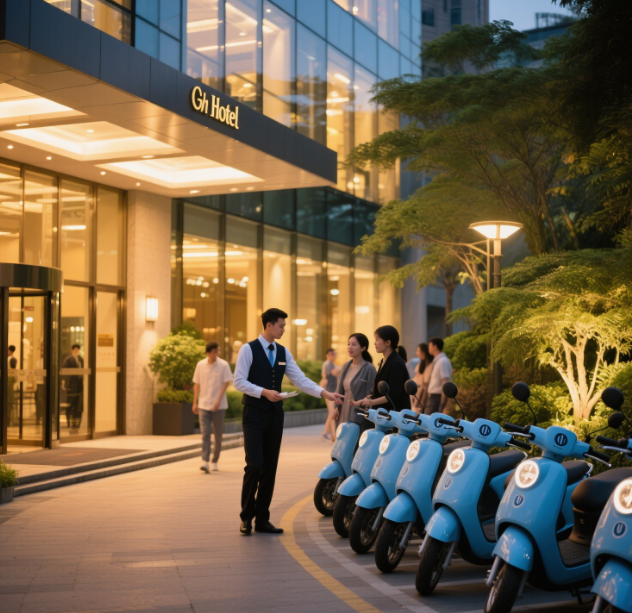As the travel boom surges, hotels – the central hubs accommodating “dining, lodging and transportation” – face a dual challenge: managing skyrocketing guest volumes while differentiating themselves in an oversaturated tourism market. When travelers grow weary of cookie-cutter hospitality services, how can hoteliers capitalize on this mobility revolution?
What are the challenges the hotels facing?
- Service innovation stagnation: Over 70% of midscale hotels remain confined to basic “room + breakfast” offerings, lacking the strategic framework to develop unique guest experiences.
- Single-source revenue challenge: With 82% of revenues deriving from room bookings, hotels must develop complementary income streams that naturally enhance guest experiences.
- Emission-intensive reality: Hotel is responsible for nearly two-thirds of the industry’s staggering 11% global emissions share, according to Ctrip’s partner summit findings.
At this point, starting e-bikes rental services becomes prominent. This innovative service that integrates green travel with scene experience is opening up a breakthrough path, which features in the structure about environmental benefits – customer experience – business returns.
What are the benefits for hotels to start
rental services?
- Enhance the competitiveness of hotel: It offers guests a flexible and convenient short-distance travel option, allowing guests enjoy travelling anytime and anywhere. Guests will prefer to choose the hotel providing the rental services.
- Establish the evironment friendly business image: Electric vehicle rental services, as a form of the sharing economy, conforms to the urban green transportation development plan, which not only attracts environmentalists, but also improve its international image.
- Economic empowerment: Electric bicycles can extend service scenarios, such as exploring stores within a 3-kilometer living circle, micro-travel routes in cities, and navigation to popular check-in spots, among other value-added services.
- Revenue model innovation: Firstly, hotels do not need to invest money, just by partnering with third-party operators through providing places. Hotels can earn additional revenue through rental sharing or venue fees without bearing the costs of vehicle procurement and maintenance. Secondly, the rental service can be integrated into the hotel membership system. Customers can redeem room vouchers through mileage points.

Tbit–Smart Bike Solutions Provider for Rental Services.
- Intelligent terminal management system:The triple positioning system of GPS, Beidou and LBS can achieve real-time vehicle positioning to ensure vehicle safety and effectively avoid the risk of loss.
- Digital operation platform: Firstly, operators can dynamically adjust the charging settings according to the weather and the passenger flow during holidays. Secondly, operators can monitor the vehicle status in real time and systematize the scheduling management to avoid idle or short supply of vehicles. Thirdly, system has many measures to ensure the smooth progress of transactions, such as pre-lease credit assessment, withholding and remittance and AI-Powered Collections.
- Security guarantee system: Smart helmet +Electronic fence + Standardized parking+ Insurance service.
- Multi-channel marketing strategy: Tbit has many online and offline channels. Online includes TikTok and Rednote. Offline includes surrounding business cooperation.
In conclusion, driven by both the experience economy and the low-carbon transformation, vehicle rental services has broken through the single attribute of a means of transportation. Achieving a positive cycle of “environmental value – user experience – business return” through intelligent solutions will open up a second growth curve for hotels.
Post time: May-19-2025
.png)



